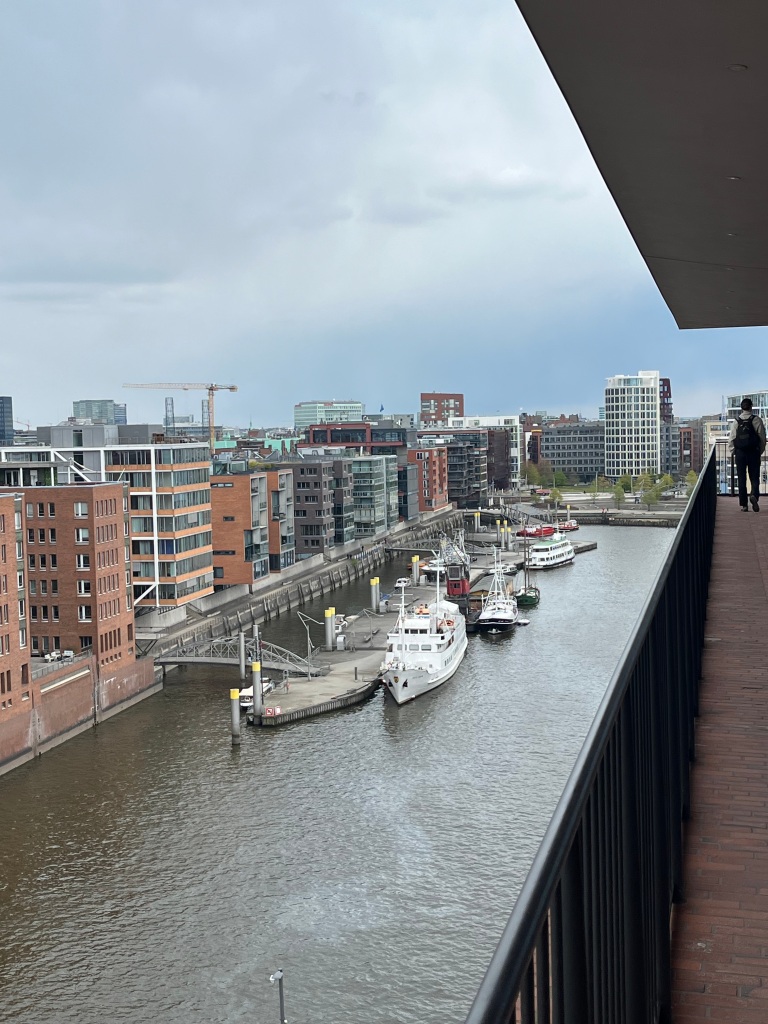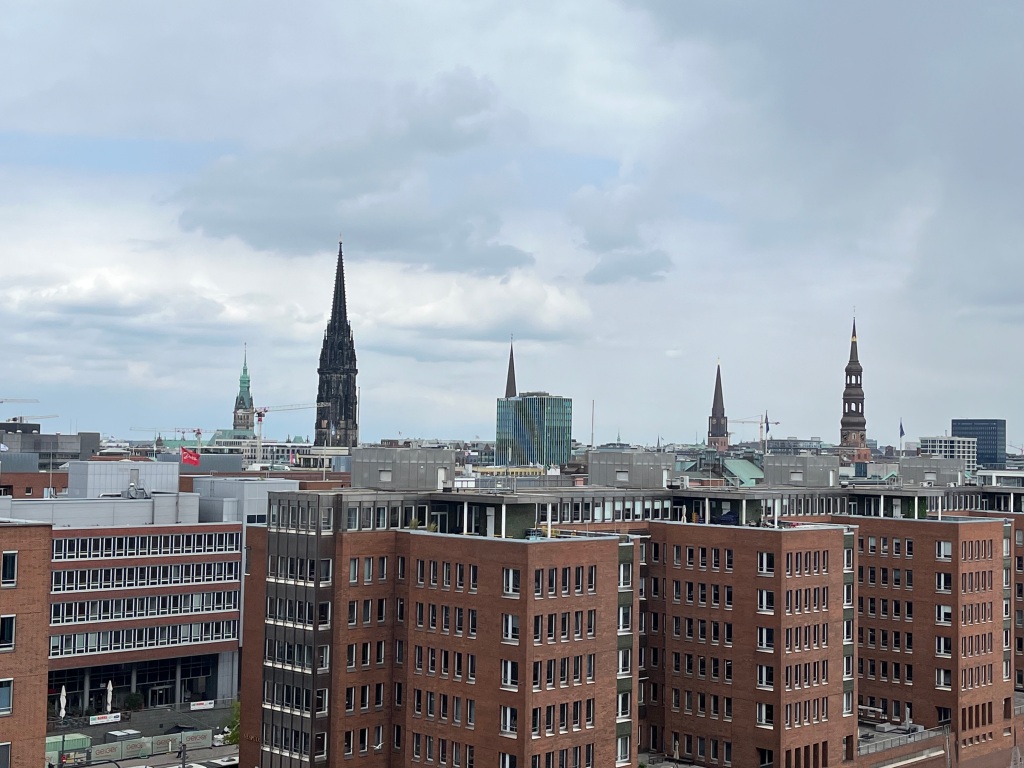At latitude 53.5, dawn comes early. I didn’t close the drapes completely, so I woke up around 6:00. I ground some beans and enjoyed two cups of coffee. The Airbnb host had an ab roller so I pumped out 4 sets of 20.
I walked about .75 km to the Ottensee S-Bahn station to grab a train to the Jungfernstieg station, where I was to meet my small group city tour at the magnificent Rathaus (City Hall), rebuilt in the 1890’s after the original was destroyed in the catastrophic fire of 1842. It miraculously survived the late July 1943 Anglo-American bombing campaign that devastated the city. I was early, so I bought two amusing postcards for my little grandson and posted them.


As I mentioned in yesterday’s post, the late spring weather is unseasonably cold, with highs only in the 40’s. At least we had sunshine until the early afternoon.
The tour guide was an engaging fellow, with a loud voice. There was a family from Minnesota with a precocious 11 year old son, two guys from New York, a young couple from Córdoba, Argentina and a couple from Denver. The Argentines were big fans of their new president. Also part of the group was a recently naturalized Chinese businessman from New York, who was traveling without his family. He and I hit it off and had a fascinating conversation, which I’ll recount below.
Some of the things our guide mentioned stand out. Hamburg is the second largest city in Germany, but has the largest number of millionaires. Like Bremen and Berlin, it retains the historical designation of a Freistadt, or Free City, with its own Senate. Its official name is the Free and Hanseatic City of Hamburg. It’s also the third largest port in Europe.
The Hanseatic League was a centuries-old trade confederation in the North Sea and the Baltic Sea. I’ve visited several of its former members, including Copenhagen, Gdańsk (formerly Danzig), Riga and Tallinn.
We then headed over to St Nikolaus Church, one of five soaring Gothic Protestant churches in the center (Zentrum). This 14th century church suffered a double-jeopardy: it was destroyed and rebuilt after the 1842 conflagration and then again in 1943’s Operation Gomorrah. It wasn’t rebuilt after the bombing and stands as a war memorial. Since I can read some German, I saw an inscription to die Opfern (victims) of the 1943 raid. Our guide mentioned 700 fighters, but I privately told him that it was over 700 “bombers” that conducted the raid. He was thankful for the correction.


Operation Gomorrah occurred at the end of July 1943 and lasted for eight days and seven nights. It was conducted by the RAF Bomber Command and the US Army Air Force 8th Bomber Command. It was the first mass incendiary attack on a city and occurred after a spell of particularly dry and hot weather which made for ideal incendiary potential. The bombings led to a disastrous firestorm which was whipped up by hot southern winds which reached speeds of 150 mph. People were literally vaporized. 45,000 people died and many more were injured. Over 60% of the housing stock was destroyed. A number of defense plants were destroyed. It’s amazing how the city was completely rebuilt after the war. Apparently the copper roofs with the characteristic green patina were the ones that survived.
After the tour, the Chinese-American fellow and I had a lengthy chat. He’s a huge soccer fan, so he’s been going to games all over Germany. He left China 20 years ago since he could see the direction in which the country was headed, although he still has family and friends in the Beijing area. He feels that China’s economy is far worse than claimed and that Xi is an ignorant despot. He claims that the Chinese high command understands that they’d lose a war against the US and that no middle-class Chinese would want to fight against Taiwan. He said that their military equipment is sub-standard because of rampant corruption in the defense industry. He warns his family to get their money out of the Chinese banks since they’re already limiting withdrawals and asking what customers plan to do with the money. He’s planning a trip back to China to visit relatives but is afraid to contact some of his old colleagues for fear that they’ll report him to the secret police as a foreign agent. The Ministry of State Security gives tattletales a $75,000 bonus for turning alleged agents in. He plans to keep a low profile and carry a lead lined bag for his computer and cell phone. The way he described Xi’s background made me laugh, and he joined in. When I asked him about the Uighurs, he told me about a high-ranking general who his family knows who was also the regional commander of Xinjiang province. He told me that initially the Uighurs attacked and killed Chinese officials and that they ignored the general’s warnings to desist. When they continued the attacks, the People’s Liberation Army wiped out a number of Uighur towns and even killed all the animals in a scorched earth operation. I wished him luck on his travels and marveled once again at the people and conversations that occur when I travel abroad.
I took my acquaintance’s advice and went up to the viewing deck of the massive Elbphilharmonie and took pictures of the city and the new Hafen City, which will house over 30,000 people when it’s completed in 2030.







After a late lunch I visited the outstanding Museum für Kunst und Gewerbe near the Central Station. They have three floors of applied arts and statuary from ancient Egypt through the Art Nouveau and Art Deco periods, in addition to a fascinating gallery devoted to water and its conservation. After about 90 minutes I started to yawn, so I went back to the S-Bahn station for a quick return home. Grabbed some takeout and spent the evening at the Airbnb and then slept soundly for over nine hours. It’s currently raining, so I’ll wait for it to clear before heading out.






